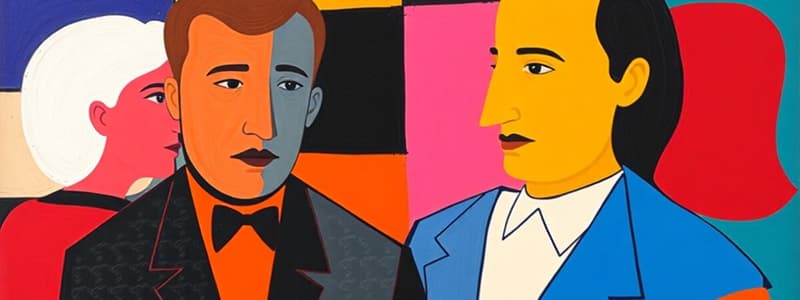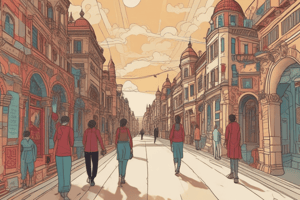Podcast
Questions and Answers
What does Bourdieu mean by the term 'field'?
What does Bourdieu mean by the term 'field'?
- A theoretical concept with no real-world application
- Any domain marked by competition among individuals (correct)
- A social construct that does not influence behavior
- A strictly defined geographic area
What is 'doxa' in the context of Bourdieu's theory?
What is 'doxa' in the context of Bourdieu's theory?
- A form of cultural resistance
- An individual's personal goals
- The legitimate beliefs and practices within a field (correct)
- The economic capital of a field
Which strategy do those in top positions in a field typically adopt?
Which strategy do those in top positions in a field typically adopt?
- Autonomy, distancing from the capital of other fields
- Absorption, merging with other fields
- Heterodoxy, aiming to change the prevailing doxa
- Orthodoxy, aimed at preserving their position (correct)
What is a characteristic of 'heteronomy' in Bourdieu's framework?
What is a characteristic of 'heteronomy' in Bourdieu's framework?
Which of the following fields might be considered more prestigious in a societal context?
Which of the following fields might be considered more prestigious in a societal context?
In Bourdieu's theory, what does 'position-taking' refer to?
In Bourdieu's theory, what does 'position-taking' refer to?
How does economic capital relate to Bourdieu's concept of fields?
How does economic capital relate to Bourdieu's concept of fields?
What does Bourdieu suggest about the autonomy of fields?
What does Bourdieu suggest about the autonomy of fields?
What does Durkheim's totemic principle primarily represent?
What does Durkheim's totemic principle primarily represent?
Which of the following elements is NOT associated with Weber's description of the spirit of capitalism?
Which of the following elements is NOT associated with Weber's description of the spirit of capitalism?
How does Bourdieu theorize the development of fields?
How does Bourdieu theorize the development of fields?
What is the significance of the totem during rituals according to Durkheim?
What is the significance of the totem during rituals according to Durkheim?
According to Weber, what role does Calvinism play in the growth of capitalism?
According to Weber, what role does Calvinism play in the growth of capitalism?
What does Durkheim suggest about the moral boundaries set by the totem?
What does Durkheim suggest about the moral boundaries set by the totem?
What is NOT a characteristic of Weber's concept of the Protestant ethic?
What is NOT a characteristic of Weber's concept of the Protestant ethic?
What does collective representation involve, according to Durkheim?
What does collective representation involve, according to Durkheim?
Flashcards are hidden until you start studying
Study Notes
Pierre Bourdieu: Production of Culture
- Bourdieu argues that society is composed of various "fields" where individuals compete for prestige, status, or distinction.
- Each field has a specific form of "capital" – a resource that determines one's position in the hierarchy.
- Individuals within the field engage in "position-taking" which aims to maintain or improve their position.
- "Doxa" represents the dominant, legitimate capital within the field, typically decided upon by the top positions.
- These top positions strive to preserve their positions through "orthodoxy" – defending the existing doxa.
- Those aspiring to improve their position engage in "heterodoxy" – seeking to change the established doxa.
- Fields can be further divided based on "autonomy" and "heteronomy".
- Autonomous fields have capital specific to the field.
- Heteronomous fields rely on capital from other fields.
Emile Durkheim: Culture as a Cognitive Structure
- Focuses on the question of social integration within modern society, specifically where solidarity arises.
- Durkheim argues that "totem" – representing both the sacred and the group – plays a crucial role in generating social cohesion.
- The "sacred" aspect of the totem is reinforced through rituals that evoke "collective effervescence," a powerful shared experience.
- The totem's prominent role in rituals also leads to "collective representation," a symbol of the abstract group.
- This representation serves as a reminder of shared identity, even during periods of everyday life.
Max Weber: Culture in Action
- Examines the "spirit of capitalism" as a distinct lifestyle characterized by work as an end itself, profit as a mark of virtue, discipline, self-control, reason, and delayed gratification.
- Weber links these traits to the "Protestant ethic," particularly the Calvinist belief in predestination and the search for signs of one's chosen status.
- The need to reassure themselves through hard work, according to Weber, fueled the rise of capitalism.
- Calvinists invested their profits, leading to economic growth.
Studying That Suits You
Use AI to generate personalized quizzes and flashcards to suit your learning preferences.




